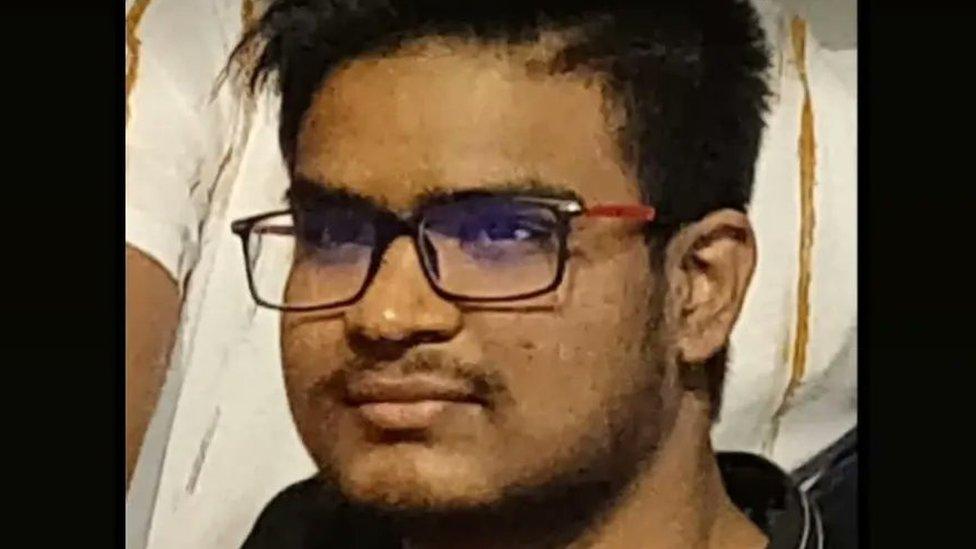Ukraine crisis: Afghan family pleads for Canada's help
- Published
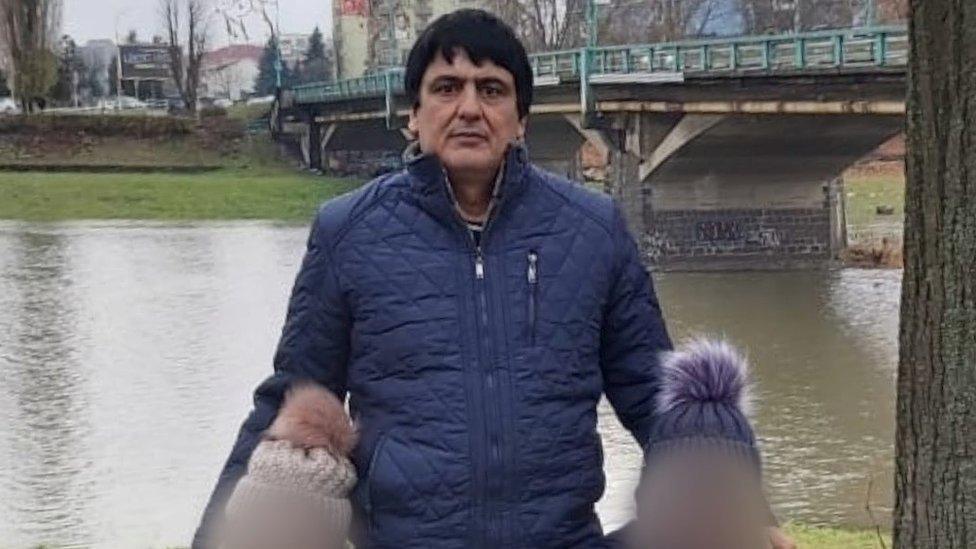
Mir Safi and two of his three children at a refugee camp in Ukraine. Courtesy of the Safi family.
Former government prosecutor Mir Safi was among the thousands of people evacuated from Afghanistan's Kabul airport last August, fearful of retribution from the rapidly advancing Taliban.
Six months later, Mr Safi and his wife, nephew and three children - one just a week old - were again forced to flee, this time from a war in Ukraine he said is "more dangerous" than Afghanistan. They faced the Russian invasion, paperwork woes, medical issues and what Mr Safi said was an often hostile Ukrainian population.
"When I was in Afghanistan, I did not expect the Taliban would come to power. But they came, and I escaped," Mr Safi told the BBC on a Zoom call from western Ukraine on Tuesday, translated by his Vienna-based brother Ali. "I also never thought that Russia would attack Ukraine. We never expected it. This is a conventional war, with missiles and bombardments. It is totally different."
Again on the move, Mr Safi now hopes to head to Canada, where - as a veteran of the Afghan justice system - he likely qualifies for a government immigration process for human rights defenders. This work, along with a part-time job as a fixer for a US media outlet, allowed him to get approved to leave Kabul and onto a Ukrainian transport plane headed to Kyiv.
On Wednesday night, the family was finally able to cross to Poland, according to his brother and a Canadian woman who has been helping the family. By Thursday morning, they were in Berlin.
His efforts to leave Ukraine were difficult. In the last week, he was detained by Ukrainian soldiers, repeatedly turned away at the border and hamstrung by administrative difficulties. His daughter Soumaya - who was born the day before the war started - only had a photocopy of her birth certificate for identification. His 18-year-old nephew Yaser has no passport after being unable to get one in time amid the frantic rush to leave Kabul in August.
On Tuesday, for example, Mr Safi said the family was turned away from the border and sent to a nearby clinic to obtain identification, only to be told that none can be issued as a result off Soumaya not having a certified birth certificate. He then tried make a three-hour drive to the hospital where she was born, but was told the roads were closed. With air raid sirens blaring nearby, he headed back to the school where his family had taken shelter. At times, they've gone hungry.
"There was danger. Everyone was running," he said. "[The day] was not very good".
The Safi family's situation has been made worse by medical concerns. His wife and baby were not able to receive post-natal care, and he was unsure of where he could replenish medication for his diabetes once his current supply ran out. In January, the family also became ill with what they believe may have been Covid-19, although there were no tests available.
His interactions with many of the Ukrainians he came across, he said, were not "very positive".
"I've come across people that hate Afghans. They've nearly attacked me, and have bluntly said that," he said. Some have explicitly told him that they blame Afghans for the fate of Ukrainian soldiers killed or wounded during the Soviet occupation of Afghanistan in the 1980s.
"It's been hopeless," he added. "They hate not only me, but Afghanistan in general. The treatment I received was very, very bad."
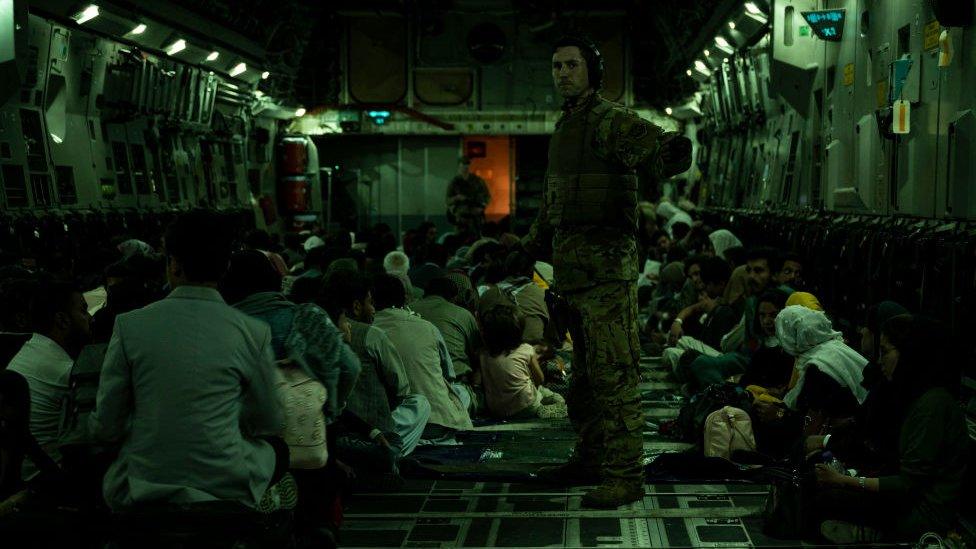
The Safi family were among the thousands of Afghans evacuated from Kabul ahead of the Taliban takeover
Among those working to help the Safi family is Caitlin Smith, a Vienna-based Canadian composer. On 28 February, she wrote open letters to Canadian Immigration Minister Sean Fraser and immigration critic Jenny Kwan, highlighting the Safi's plight and asking for help.
The letters asked that the Canadian government guarantee the family be permitted to leave Ukraine and apply for resettlement in Canada, expedite the resettlement process, and prioritise Afghan refugees who are now facing danger in Ukraine.
For Mr Safi, returning home is not an option. As a former prosecutor for Afghanistan's attorney general, whose job included prosecuting Taliban fighters, he's received numerous death threats on social media since arriving in Europe.
So far, Ms Smith said that she and the Safi family have so far not received any response from Canada's refugee agency, although they are hopeful that they will. She told the BBC she discussed the case with Ms Kwan "at length" on Wednesday, as well as the wider issue of Afghans trapped in Ukraine who hope to resettle in Canada.
"Canadians like to have that pictures of ourselves as people that help when we can," Ms Smith said, but she believes the Liberal federal government "failed to provide the resources" to implement their human rights defenders resettlement programme effectively. She hopes the plight of the Safi family will encourage the government to make changes to the programme to make it easier for Afghans to apply.
Canada has brought in about 3,285 Afghans under the humanitarian programme since last August,
In response to questions from the BBC, a press secretary for Mr Fraser declined to comment on the Safis' case specifically, but said that the agency is "aware of complex cases of Afghan citizens who are seeking resettlement to Canada, but are currently in Ukraine".
In an interview, Ms Kwan also declined to comment on the Safi's case, citing privacy concerns. She said, however, that she is "seriously concerned" about the safety of Afghan refugees trapped in Ukraine.
"The situation is absolutely critical for people to get to safety," she added. "Time is of the essence and we need to get on it immediately".
Ms Kwan added that she will be bringing up the case to Mr Fraser directly, and will be discussing efforts to resettle Afghan refugees that are or were in Ukraine at a meeting of parliamentary immigration committee meeting on Thursday.
"We also need to make sure that they look into and make arrangements for transportation as well," she said. "People will have no means to be able to get to places".
In the meantime, Mr Safi is holding out hope that Canada will come to his family's aid.
"I want the Canadian government to make an urgent decision about our resettlement. I had a good life in Afghanistan. Apart from war, I was doing okay. But since I've been here, it's been like a cage," he said the day before he crossed into Poland.
Related topics
- Published4 July 2022
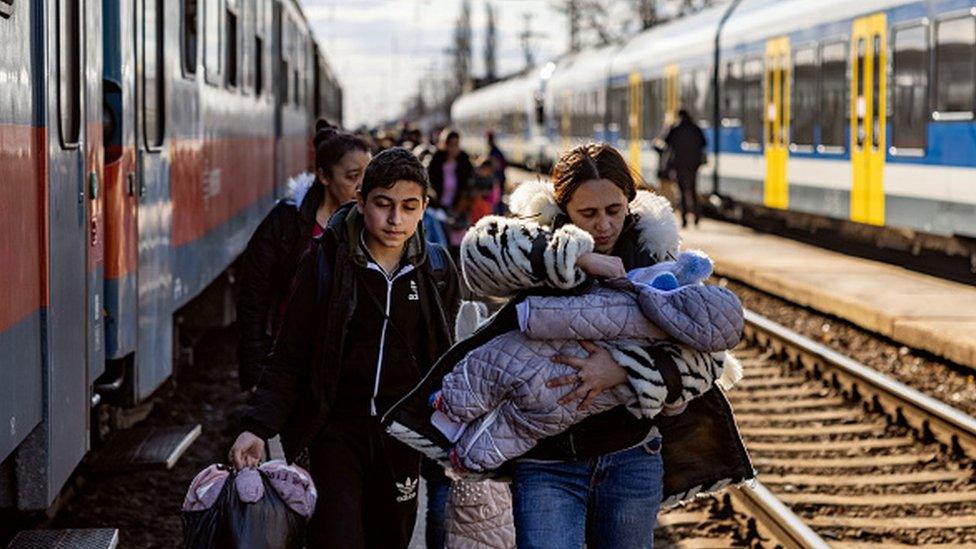
- Published1 March 2022
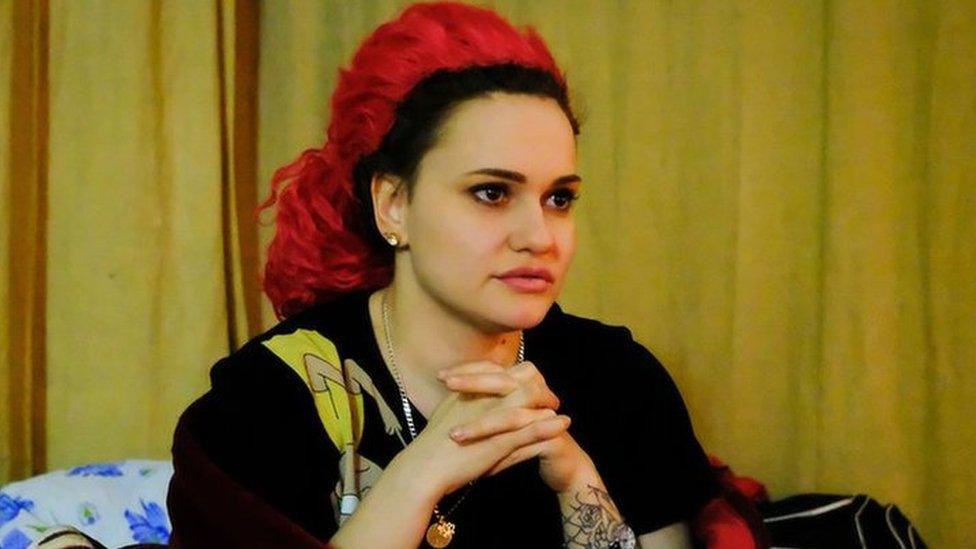
- Published1 March 2022
